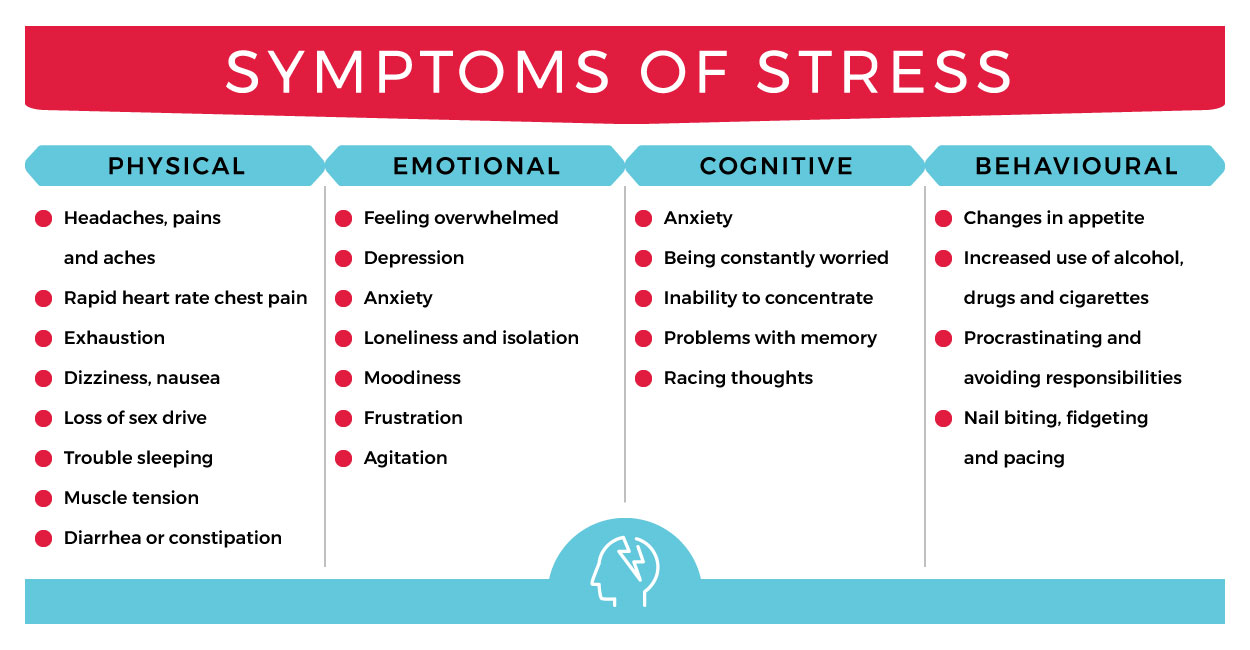Stress. I bet almost everyone can relate, especially this year. It’s no secret that these past months have been more stressful than any other average year. Our professional and personal life combined in the same space, the uncertain future, worrying about our health and wellbeing of our family and friends along with the lack of social contact are just a few factors that added to the usual mix.
This month, as a way of contributing to raising awareness about stress, in our articles we will focus on providing information about symptoms of stress, available resources and tools to manage stress and the relationship between stress and physical activity.

ABOUT STRESS AWARENESS MONTH
“According to the Mental Health Foundation 74% of UK adults have felt so stressed at some point over the last year they felt overwhelmed or unable to cope.”
Every April, since 1992, Stress Awareness Month is held, with the aim of increasing awareness about the causes, signs and symptoms of stress along with ways to manage it and the available resources that can help.
This year, the Stress Management Society are holding a 30-day challenge for regaining connectivity, certainty and control, which have been the three key causes for concern during the pandemic. To participate in this challenge, all you need to do is pick one action each for your Physical, Mental and Emotional Wellbeing and carry it out every day throughout the month. Here you can find out more about this challenge and download the resources they provide.

WHAT IS STRESS?
Firstly, let’s make it clear that stress is not always a bad thing. Stress is your body’s physical response to danger. When stressed, your body thinks it’s in danger and switches to the “fight or flight” mode, releasing a mix of hormones and chemicals such as adrenaline, cortisol and norepinephrine. Those are crucial to prepare your body to fight agains the perceived danger. In order to focus its full power on fighting the danger, your body stops all the “unnecessary” functions – for example digestion.
If this happens when we are in actual danger, this process can save our lives – our body sends us a rush of energy that enables us to act against the danger and focus on making the life-or-death decisions. The problem begins when we start feeling stress in inappropriate situations or for prolonged periods of time.
When in stress our brain function is minimised as our body focuses on delivering blood to muscles needed to flight or flee, which is why being in stress for long periods can be detrimental to our health. When in stress, our digestion and brain function slows downs, cortisol levels are elevated and our heartbeat and breathing speeds up. All of these responses can save our life in an emergency situation, but are dangerous to our health if they take place too often or for too long. Prolonged stress may lead to lower immunity levels, digestive and intestinal issues or mental problems such as anxiety or depression.

COMMON SIGNS AND SYMPTOMS
It’s impossible to name all of the different signs and symptoms of stress especially because they vary from person to person and depending on a variety of factors the symptoms might be more or less obvious… or even unnoticeable. As a good start here’s a list of a few common stress symptoms.


AVAILABLE RESOURCES
When struggling with stress, reaching out for help is crucial. If you feel overwhelmed, don’t hesitate to contact your GP as they will be able to provide professional help and support. If you’d like to find more information about stress and how to manage or prevent it, here’s few helpful resources:
The Mental Health Foundation focuses on stress managment and prevention. On their website you will find numerous publications and studies related with stress. It’s packed with information about and helpful tools concerning mental health.
On the NHS site, you’ll always find the latest information about stress, where it comes from, its symptoms, how to manage it and how to get support. If you feel like you can’t cope with the levels of stress follow the guidance on how to arrange an appointment with your GP and what to do in case of emergency.
The World Health Organisation released a guide on “Doing What Matters in Times of Stress”. It’s an illustrated guide that aims to shows how to manage stress in a practical way. The self-help techniques and the audio exercises take only few minutes a day and can improve the ability to cope with anxiety, stress and adversity. On their website you will find information on several topics concerning mental health – including resources on how to deal with stress in the workplace.

STRESS MANAGEMENT TIPS
EAT HEALTHY
Healthy diet can have a positive influence on your mood and provides necessary nutrients, vitamins and minerals. The antioxidants found in foods such as berries prevent cells from damage caused by chronic stress. Additionally, proper hydration improves energy levels and cleanses your body.
EXERCISE
Physical activity comes with many benefits including improving sleep quality. Proper rest can be crucial when it comes to stress management. Exercising also stimulates your body to release endorphins that can positively affect your mood and help relieve pain and anxiety.
RELAXATION TECHNIQUES
There’s many practices and techniques that can help you relax including yoga, meditation, breathing exercises and practicing mindfulness. Yoga practices that focus on slow movement, stretching and breathing can help lower anxiety, stress and chronic pain. Practicing deep breathing will help go into state of deep rest; and consequently, calm parts of your nervous system.

As part of Stress Awareness Month, over the next 30 days our articles will be focused on providing resources and information about stress, its prevention and management.
In the meantime make sure to have a look at our articles on benefits of daily yoga sessions, how to keep active whilst working from home, how to stay fit in the lockdown and home workouts with Gordie.




